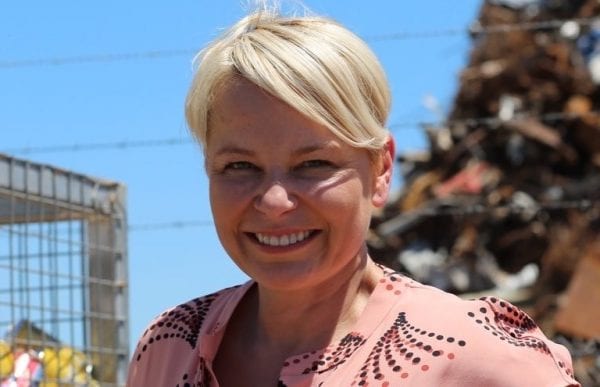While Narelle’s tenacity was unshakeable, she admits that working in an industry so heavily dominated by men, wasn’t easy. She regularly faced obstacles and contended with frequent unconscious bias– a result of being both Indigenous and female. It didn’t stop her.
In 2000, Narelle became the first Aboriginal woman to solely own a waste management company, CBD Enviro Services. She built it up, expanded it and sold it through a trade sale to a large public company– paving the way for the launch of Envirobank Recycling, an innovative, automated, consumer recycling network of which Narelle is both founder and Managing Director.
In 2008, Envirobank became the first collection, reward and redemption platform for empty bottles and cans for recycling. The automated depot system was rolled out across the Northern Territory and NSW with Queensland following this year.
As an Indigenous woman and entrepreneur Narelle says the business made perfect sense. “My culture makes me a custodian of the land so cleaning up the country seems a natural fit,” she tells us. We checked in with Narelle this week, to hear about her personal journey, her drive to succeed and her thoughts on Australia’s environmental progress.
What was the catalyst for starting Envirobank?
I founded Envirobank Recycling in 2008 to incentivise recyclers and introduce the concept of Reverse Vending Technology to Australia. This same type of technology is now underpinning the Australian Government’s Container Deposit Schemes (CDS) being rolled out across Australia.
What is your biggest source of inspiration/motivation?
My great uncle was the late Senator Neville Bonner, a recognised elder of our community and the first Indigenous Australian to become a member of the Parliament of Australia. He left an amazing legacy and I am trying hard to follow in his footsteps and make a difference.
How has the business grown since inception?
Envirobank began as a new development in the waste industry with a collection, reward and redemption platform for empty bottles and cans for recycling. We essentially pioneered the development and structuring of the automated depot system with the Northern Territory Government, launching centres both in Darwin and Alice Springs. This created opportunities for Indigenous populations to participate in the Scheme – from remote communities, to social welfare collection and sorting, to raising much needed funds.
More recently, legislation was enacted to create a Return and Earn Scheme in New South Wales and Envirobank has opened two more commercial depots – one in Revesby and one in West Gosford – to enable the bulk return of empty containers. These depots are growing rapidly as the population takes up the opportunity to receive a monetary reward for their empty bottle and drink containers.
We also continue to sign on key partners such as Surf Life Saving NSW, and with many thousands of surf club members up and down the coast, there is enormous opportunity to fundraise for one of our greatest volunteer organisations.
Queensland Container Deposit Scheme (CDS) legislation is next to be enacted and we will roll out 10 new depots in Queensland. Following Queensland is Western Australia and Victoria so the scope and potential for growth for Envirobank and its partners is significant.
What unique challenges have you faced?
Being a woman in a male-dominated industry is one thing, and being an Aboriginal woman is another. I have often struggled with my identity because my skin is more milk than coffee, and my heritage is often not recognised by non-Aboriginal people. I am, however, always recognised by my own people, and as I am older and hopefully wiser now, I don’t worry so much anymore about other people’s opinions. It’s taken me some time to get to that place and it saddens me still to hear so much unconscious bias towards Aboriginal people.
What measures did you take to grow the business in its early stages?
Well nothing grows a business like hard work, determination and self-belief.
What does the future hold for Envirobank?
We are striving to clean up the country and ensure that every Australian has access to the economic benefit of recycling with Envirobank.
How would your family, friends and community describe you?
My friends call me ‘Morrie’. He was a wise old man who taught life lessons from the book ‘Tuesdays with Morrie’, and I suppose that’s like me. I am always looking for the life lesson in my experiences and guiding others to find theirs.
My family would also say she is a master at organising fun family activities!
What steps would you urge organisations to take when it comes to environmental policy?
Take action. Even small steps count. Every step counts. Just get started.
Do you feel Australia is making progress when it comes to recycling?
We are making progress but we also continue to increase consumption and waste at a more rapid rate than sustainable waste management. We also face external challenges due to reduced export markets.
There is greater opportunity today than ever before but its needs Government focus, funding and support coupled with industry innovation to really move the needle.
What advice would you have for other emerging female entrepreneurs?
Never give up and always believe you can achieve your goals. Some days this will be harder than others, but every new day offers a new perspective and an opportunity for renewed determination.



